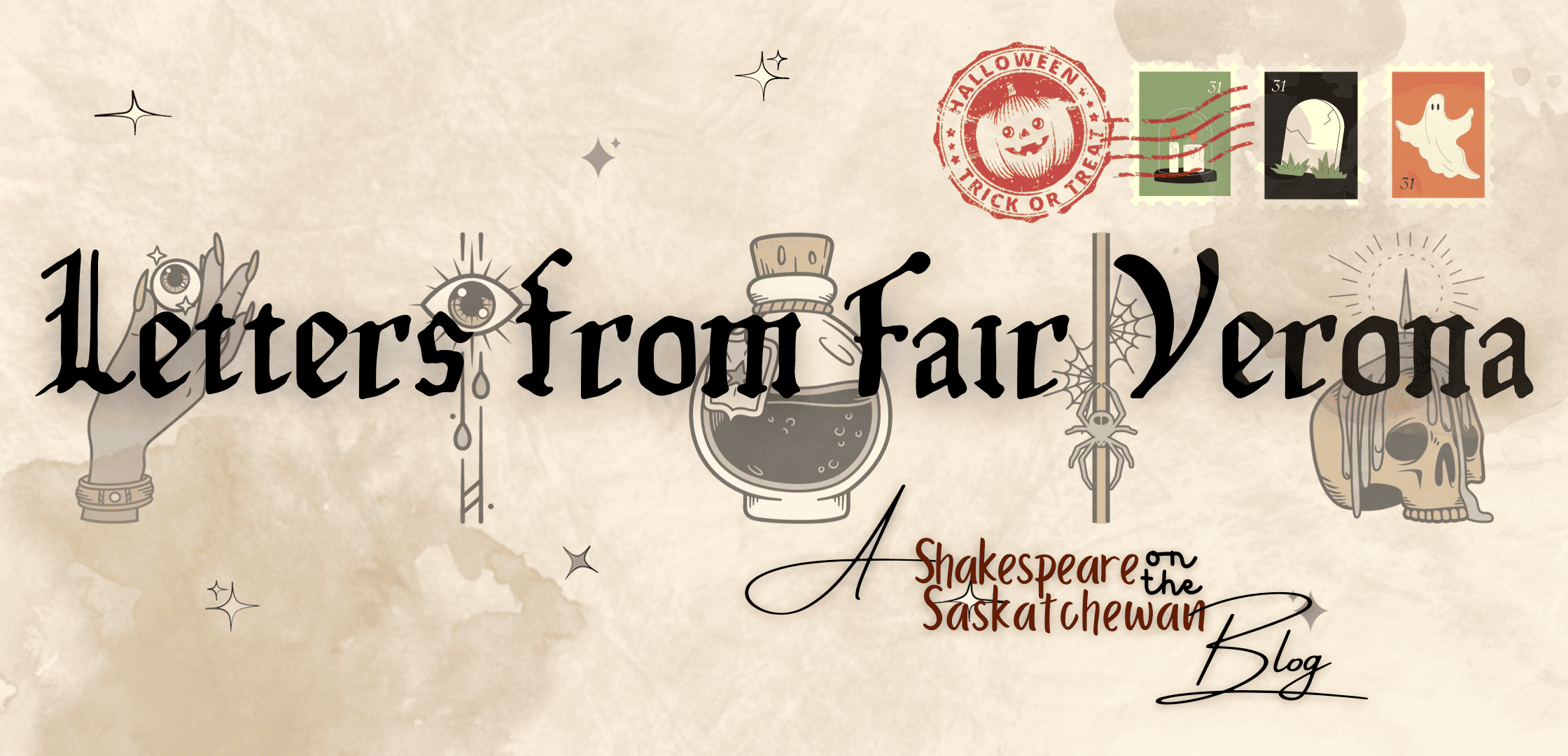
The Curse of the Scottish Play
October 6, 2023
Dear Shining Saskatoon,
There is something oddly beautiful in the change of seasons, but especially that of summer slowly slipping into fall. It’s macabre, true, to enjoy the changing of leaves as they wither in the cold, crisp autumn air, and fall off the now bone-like white limbs of trees that rise from the earth towards a black sky like the alabaster hands of skeletons. The leaves’ descent toward an earth that is slowly cooling from the heat of another summer is both satisfying and melancholic in a beautifully dark way. I wouldn’t call it beauty in death, per se, but rather a beauty in rest and of the liminal space between this and that, here and there, now and then. For we know that the trees and the plants and the vitality of the summer will return once more – but for now, it rests. And while it rests, we are tempted by the darkness and all that lies within it.
October has become widely synonymous with all things that go bump in the night: vampires, witches, goblins, and ghouls. The monsters of lore find new ground in this time of the year, and we either revel in the things that scare us or hide from them. For me, dear reader, I can’t help but be fascinated by the supernatural and, especially, the role these creatures have played in our past and in our storytelling. William Shakespeare was not afraid of the dark, and nothing has become scarier in theatre than saying the name of a certain Scottish play aloud during its production…
The now 400-year-long curse of Macbeth has only grown in notoriety as the centuries pass. As the tale goes, in 17th-century Britain, a coven of witches was upset at Shakespeare for using real spells and real incantations in the scenes involving the three witches of Macbeth. In retaliation, they placed a curse on the play, and was seemingly the cause for the unexpected (and accidental) deaths of at least two actors in the original production. From a 21st century perspective, it is clear as to why such a legend was born, especially in the tumultuous social climate of 1606, where King James I had only just inherited the crown of England from Queen Elizabeth I three years prior, formally uniting a politically tense Britain and Scotland under one monarch. King James was, by all accounts, a peculiar ruler, whose obsession with witch hunting and magic, best summarized within his own published compendium on witchcraft lore entitled Daemonologie in 1597, did not go unnoticed by his subjects and especially not by William Shakespeare. Shakespeare received patronage from both King James and his wife, and likely wanted to stay in his good graces. In Macbeth, Shakespeare even references a close encounter King James was said to have had with witches while sailing off the coast of Scotland, where his ship met bad weather that he believed had been conjured by witches who were intent on drowning him. He ordered a witch hunt upon his return, but whether he was successful in his search remains unclear. Was the bad luck that plagued the original play evidence of a witchy intervention, or was the social climate of early 17th-century Britain, under the rule of a witch-obsessed King, too quick to attribute such coincidences, even as dark and unfortunate as they may have been, as anything but?
Other theatres throughout history have chalked up seemingly bad luck and unfortunate coincidences to the curse: the Astor Place Riot in New York in 1849, caused be a rivalry between two actors that were both playing Macbeth in opposing productions at the time, resulting in at least 20 deaths and over 100 injuries; other countless injuries, falls, and burns sustained by actors performing the play throughout the 20th century; a death caused by a sword fight scene in Macbeth gone awry in 1947, and even a theatre being accidentally burned to the ground during a production of the Cursed Play. Sure, perhaps these can all be credited to mere coincidence: an instance of finding the curse simply because one is searching for it. But can we be positively certain that is the case? Obviously not, or else we wouldn’t keep attributing the bad luck of theatres to the curse.
The curse thus envelopes a liminal space in our theatres between fact and fiction – we cannot be completely sure the curse is not real, just as we cannot be positively certain the curse is real. And so, we keep saying The Scottish Play, or Maccers instead of the play’s name itself. We still keep peering into the darkness and being shocked at the possibility something else is the cause of our misfortunes. Whatever the case, if you do happen to utter the play’s name aloud in a theatre, you would do well to quickly cleanse yourself by leaving the theatre, turning three times, spitting over your left shoulder, reciting a line from another Shakespeare play, and waiting to be invited back into the theatre to effectively rid yourself (and the production) of the curse. If you don’t you might be fine…but then again…maybe, you won’t be.
“Fair thoughts and happy hours attend on you” (Merchant of Venice, 3.IV),
From Fair Verona

